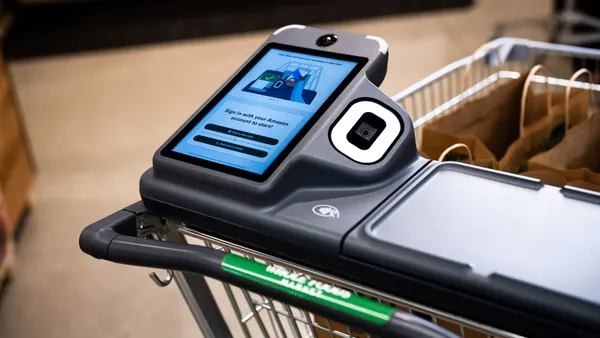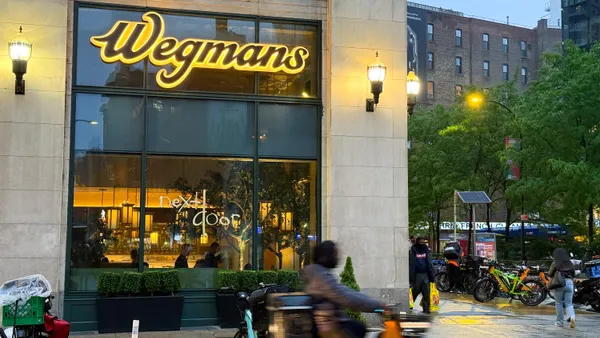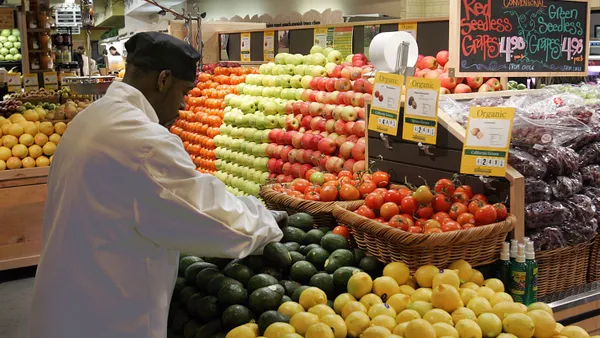With unemployment hovering below 4% and jobs available across the retail industry, grocers are doing everything they can to keep a tight hold on their employees and ensure quality control in their stores. For Southeastern Grocers, which employs 45,000 employees across four supermarket banners, that includes implementing alternative training methods.
The retailer recently partnered with Waterloo, Ontario-based training software provider Axonify on a "microlearning" platform that delivers three to five minutes of information a day to store associates on mobile devices through a program called Gnome. The retailer started off with voluntary cashier training with about 12 topics and now the platform trains all 45,000 associates across 450 topics, Liz Thompson, Southeastern Grocer's Chief People Officer, told Grocery Dive at the recent National Retail Federation show in New York.
Thompson told Grocery Dive she was looking for something innovative and personalized that focused on knowledge retention. Not only does the platform train associates in bite-sized portions, but it is designed to close the knowledge gap between beginner, intermediate and expert and adapt to workers’ experience level, Thompson said. In addition, the platform can also be used as a communication tool between high-level corporate employees and associates, said Carol Leaman, CEO of Axonify.
“It makes it feel like the organization is investing in them and making them a better, more knowledgeable employee,” she added.
Since the company-wide rollout in 2016, the adoption rate among employees has increased from 85% to 97% and there has been a knowledge lift of 15%, said Thompson. The platform has also been directly linked to business results, she added. Stores with the highest engagement using the platform have higher comp sales.
According to the Association of Talent Development, companies that offer a comprehensive training program enjoy 218% higher income per employee and these companies also earn 24% higher profit margin than those that spend less on training.
Southeastern Grocers isn’t the only retailer pouring funds into employee retention initiatives. Last year, Kroger introduced “Feed Your Future,” a program that provides funds for continuing for all workers no matter what degree they are pursuing. Many of the country's largest retailers, including Walmart, Amazon and Target, have recently increased their minimum wage. Other companies are introducing additional perks, like a relaxation of dress and grooming codes. Publix recently announced it would relax its no-beard policy for workers.
All this comes as retailers are boosting hiring to help them compete. Aldi, Dollar General and Schnucks have all gone on hiring sprees lately, while Walmart has added 30,000 new jobs in grocery since the launch of its curbside pickup program.
"It makes it feel like the organization is investing in them and making them a better, more knowledgeable employee."

Liz Thompson
Chief People Officer, Southeastern Grocers
At this point in time, employees have the upper hand and according to experts, retailers are going to have to do more than raise wages to keep them around. With its new training app, Southeastern Grocers hopes employees will see an investment in their future and improved satisfaction with their jobs.
That, in turn, is providing improved customer service and better conversion rates on its loyalty program, said Thompson.
“There are certain service behaviors that we want to train our cashiers on but we also have a loyalty program which is a differentiator for us,” said Thompson. “We really wanted to make sure they had strong knowledge of that loyalty program with the customers. The stores that had more training were converting more customers to the loyalty program. It’s the relationship with our customers that build loyalty and those relationships are critical.”
In addition to improving its customer service and employee training, Southeastern Grocers is also updating stores across its Winn-Dixie and Bi-Lo brands. The company emerged from Chapter 11 bankruptcy last summer and said it would accelerate store remodels under its new capital structure. As price competitiveness in the supermarket industry intensifies, and as more shoppers migrate online, experts say it's important retailers improve their store experience.











